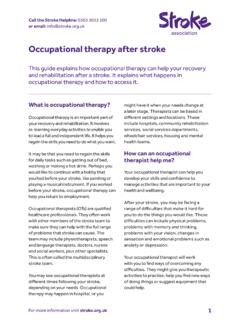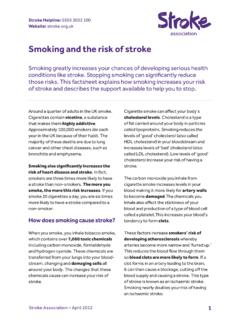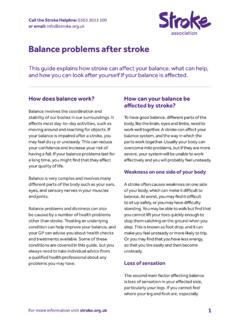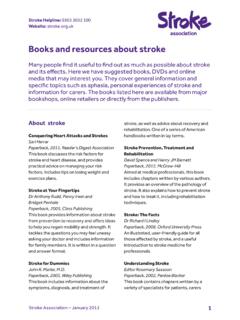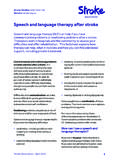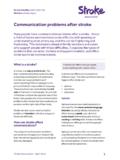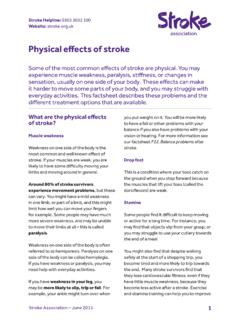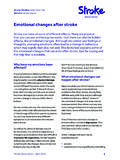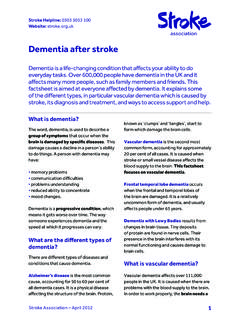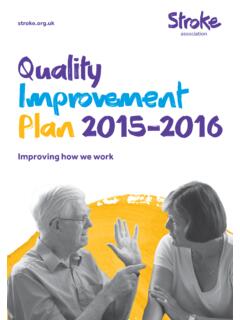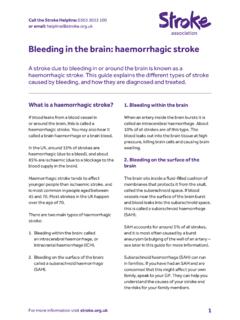Transcription of Alcohol and stroke
1 stroke helpline : 0303 3033 100 Website: Association October 20141 This factsheet explains how Alcohol can increase your risk of stroke and why you should think about cutting down. It includes tips that can help you reduce the amount of Alcohol you drink as well as details of where you can find information and support to help you. Alcohol and strokeHow can drinking Alcohol increase my risk of stroke ?Research shows that drinking large amounts of Alcohol can greatly increase your risk of having a stroke . This is because Alcohol contributes to a number of medical conditions that are risk factors for stroke : High blood pressure is the most important risk factor for stroke , contributing to over 50% of all strokes in the UK. Drinking too much Alcohol raises your blood pressure.
2 Diabetes doubles your risk of stroke . Drinking Alcohol can change the way your body responds to insulin a hormone that helps use up the sugar in your blood. This can lead to type 2 diabetes. Being overweight increases your risk of having a stroke . Alcoholic drinks tend to be very high in calories, so regularly drinking lots of Alcohol can make it more difficult to maintain a healthy weight. Atrial fibrillation and Alcohol Drinking excessive amounts of Alcohol can trigger atrial fibrillation a type of irregular heartbeat. Atrial fibrillation increases your risk of stroke by five times, because it can cause blood clots to form in the heart. If these clots move up into the brain, it can lead to stroke . Liver damage due to too much Alcohol can stop the liver from making substances that help your blood to clot.
3 This can increase your risk of having a stroke caused by bleeding in your I drink Alcohol if I ve had a stroke ?As well as increasing your risk of having another stroke , there are other ways Alcohol can have an impact: Drinking Alcohol when you re taking medication can have harmful effects. Too much Alcohol can be particularly harmful if you are on blood-thinning medication, such as warfarin. So if you ve been prescribed medication following your stroke , make sure you ask your GP or pharmacist whether you can drink whilst taking it. If you ve had a stroke , you may be more vulnerable to the negative effects that Alcohol can have. If you re sleeping badly, have poor balance or speech problems, Alcohol could make these worse.
4 stroke Association October 20142 Alcohol and stroke Alcohol can also worsen mood swings and depression, which are common after stroke . It can also affect your memory and thinking. Alcohol makes you dehydrated, so if you re suffering from headaches, drinking Alcohol could make them worse. Alcoholic drinks are high in calories that have no nutritional value. So drinking Alcohol can make it difficult to maintain a healthy weight. This is particularly important if you are less active than before your stroke , as you will need to reduce your calorie intake to avoid becoming overweight. If your stroke was caused by bleeding in or around your brain (a haemorrhagic stroke ), you must avoid Alcohol for at least the first three weeks after your stroke .
5 You should then ask your doctor when it would be safe to start drinking Alcohol again. So, if you ve had a stroke , it s important to think about the amount you drink and whether you need to cut down. Your doctor will be able to advise you and tell you about services and support that can help you do Alcohol guidelines: 14 unit maximum for men and womenThe Alcohol limit for men has been lowered to be the same as for women. The UK s Chief Medical Officer guideline for both men and women is that: You are safest not to regularly drink more than 14 units per week. This is to keep health risks from drinking Alcohol to a low level. If you do drink as much as 14 units per week, it is best to spread this evenly across the drinking When it comes to single drinking occasions, you can keep the short-term health risks at a low level by sticking to a few simple rules: limiting the total amount of Alcohol you drink on any occasion drinking more slowly, drinking with food, and alternating with water.
6 How much is 14 units of Alcohol ?One unit is 10ml of pure Alcohol . Because alcoholic drinks come in different strengths and sizes, units are a good way of telling how strong your drink is. It s not as simple as one drink, one units is equivalent to: six pints of average strength beer or six 175ml glasses of average strength wine. A single drink can contain A small glass (125ml) of wine (ABV 12%) is units. A standard glass (175ml) of wine (ABV 12%) is units. A large glass (250ml) of wine (ABV 12%) is 3 units. A pint of lower strength lager, beer or cider (ABV ) is 2 units. A pint of higher strength lager, beer or cider (ABV ) is 3 units. A single shot (25ml) of gin, rum or vodka (ABV 40%) is 1 unit. stroke Association October 20143 Alcohol and strokeHow can I cut down?
7 First of all you need to work out how many units you re drinking. You can find out by keeping a drinks diary . For a couple of weeks, at the end of each day, make a note of what you drank and count up the units. There are also websites and phone apps that can help you do this. See the end of this leaflet for you find that you are regularly drinking more than the recommended limit, some of the following tips may help you cut down. Ask your GP for advice, or contact some of the organisations listed at the end of this factsheet. Set yourself a daily Alcohol limit and stick to it. Work out when you do most of your drinking and see if there are obvious times when you can cut back. Ask for support. Tell your family and friends that you re cutting down - they can help you reach your goals.
8 Don t drink on an empty stomach. Drinking with food slows down the rate that Alcohol is absorbed into your bloodstream. Go for smaller sizes so have a bottle of beer instead of a pint, or a small glass of wine instead of a large. Have regular Alcohol -free days to avoid becoming dependent on drink. Try to alternate each drink with a glass of water or a soft drink. This can cut down on the Alcohol you re drinking, and help avoid becoming dehydrated. If you re drinking in a group, avoid buying rounds, as this can encourage you to drink more Alcohol , more quickly. Try alternatives to Alcohol . Experiment with flavours use slices of fruit to add extra zing or try non-alcoholic versions of your usual drinks. Look for fruit drinks and Alcohol -free wines and beers.
9 When you drink at home, try to pour smaller drinks than you would get in a pub or restaurant. You can buy measures, stoppers and vacuum seals to help you know exactly how much you re pouring. Keep a range of non-alcoholic drinks that you like at home, or try making smoothies or non-alcoholic cocktails. Or you could serve drinks that are lower in Alcohol , like spritzers, cocktails or fruit punches. Many people like to drink because it helps them relax. So try to find other things that will help you do this such as yoga, relaxation sessions or complementary therapies. Depression is common after a stroke , and is often a reason why people drink. If you re feeling low or depressed, then talk to someone about it. Your doctor will be able to tell you about help and support that is available.
10 How can I find out more?Talk to usAt the stroke Association, our helpline team can give you information about stroke and tell you about services and support available in your local area. call us on 0303 3033 100 email and strokeStroke Association October 20144 stroke Association is a Company Limited by Guarantee, registered in England and Wales (No 61274). Registered office: stroke Association House, 240 City Road, London EC1V 2PR. Registered as a Charity in England and Wales (No 211015) and in Scotland (SC037789). Also registered in Northern Ireland (XT33805) Isle of Man (No 945) and Jersey (NPO 369).About our informationWe are committed to producing clear, accurate and unbiased information for stroke survivors, their families and friends.
